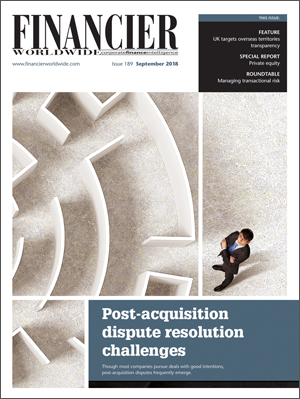The pace of technological growth recorded in recent years has been remarkable. New, disruptive technologies have emerged, remaking industries and upending traditional markets, products and industry players.
As a result, the technology sector has become one of the most targeted industries for mergers and acquisitions (M&A), attracting interest from acquirers both within and outside of the industry. Technologies and trends, including artificial intelligence (AI), cloud computing and Big Data, have drawn buyers, with technology convergence – where non-tech companies acquire technology firms and vice versa – becoming an increasingly prevalent trend. According to Thomson Reuters, non-tech companies acquired $128bn worth of technology firms in 2016, a huge leap from just $13bn in 2013. There were 98 M&A transactions globally in the AI sector between January and October 2017, according to Results International, up from 74 and 44 in 2016 and 2015 respectively. M&A in the technology, media and telecoms industry (TMT) was up 87.1 percent in value in Q1 2018 to $134bn worth of deals, compared to $71.6bn announced in Q1 2017, according to Mergermarket’s Monthly M&A Insider.
Acquirers are also increasingly investing in AI startups due to the dearth of AI talent available in the marketplace at present. According to CBInsights, the demand for AI talent is far outpacing the availability of skilled researchers, and as a result buyers are eyeing startups and other smaller companies.
Notable deals
Digital technology has quickly become one of the key drivers of global M&A activity, with companies in the industrial, travel and health industries the most active in acquiring digital businesses. A number of notable deals were announced in the first half of 2018. Broadcom’s $18.9bn acquisition of CA Technologies, PayPal’s acquisition of Swedish FinTech firm iZettle for $2.2bn and Salesforce’s purchase of MuleSoft for $6.5bn were some of the most striking deals in a market dominated by acquisitions for companies operating in the ‘Industry 4.0’ space. There has been a marked increase in competition for assets in the cloud computing and cloud-based solutions industries, and the search for mobile tech and software application providers. As these and other innovations, such as AI and machine learning, disrupt the marketplace, the tech sector will continue to attract acquirers.
According to a 2017 study from CB Insights, 51 percent of Fortune 500 investments into private tech companies came from non-tech corporations in the first half of 2017 and private tech investments by non-tech Fortune 500 corporations grew 149 percent. Non-tech companies are increasingly pursuing tech deals as a value-creation strategy.
“Digital technology has quickly become one of the key drivers of global M&A activity, with companies in the industrial, travel and health industries the most active in acquiring digital businesses.”
Around 48 percent of UK businesses have made acquisitions in order to gain next-generation technology, according to Accenture’s Tech-Led M&A Study. Thirty-nine percent noted they were active in the market to gain new capabilities.
“Our research indicates a positive trend towards businesses bringing in digital technologies and skillsets through acquisitions. Despite Brexit, these smaller deals have been relatively shielded from the wider impact of uncertainty. This ‘buy over build’ strategy comes in response to large companies wanting to fight back against new disruptors and accelerate their competitive advantage,” said Markus Rimner, managing director and Mergers & Acquisitions Europe lead at Accenture Strategy.
Data drivers
Data, as one of the most valuable commodities in the world, will also have a crucial role to play in driving future dealmaking activity. The data market is predicted to be worth $92bn by 2026, according to Herbert Smith Freehills. Done properly, tech-driven deals can add value. Data has been described as the ‘new oil’ and acquirers are pursuing deals which will allow them to exploit and monitise it. Companies are making acquisitions of data-driven organisations, of data itself and of infrastructure through which data can be processed, stored and transmitted. There has also been an increase in the number of companies entering into joint ventures and co-investments, granting them access to wider pools of data. They must be mindful of changing regulatory obligations, however. The EU’s General Data Protection Regulation (GDPR) and similar measures being explored in certain US states, such as California, will create challenges. Regulatory compliance must be achieved and a solid data strategy must be in place.
The pace of change will pick up in the coming years and companies must be prepared. The uptick in tech-focused dealmaking, particularly from non-tech companies, is indicative of that change. Acquiring innovation will be one of the biggest strategic deal drivers as sectors continue to converge, customers’ needs change and technology becomes more pervasive. Deal volumes and values are expected to rise.
Looking ahead
Dealmaking in the tech space will gather pace into 2019 and beyond as companies, including Amazon, Google and Microsoft, continue to explore growth opportunities, particularly in areas such as enterprise AI. And with private equity funds, as well as large-cap technology companies, watching on with cash to burn, companies will continue to pursue a ‘buy over build’ tech strategy.
© Financier Worldwide
BY
Richard Summerfield

